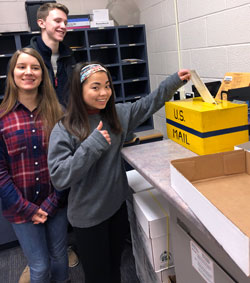When it comes to education reform, students in Anne LaGrand’s AP language and composition class think they are in an ideal position to weigh in.
“It’s been our lives for the past 10 years,” Robert James said, “so we know more about it than people who haven’t been students for 10 or 20 years and are making all the decisions.”
Junior Margaret Coney was gone an entire day visiting potential colleges. She said she was up until 2 a.m. when she got home, in order to keep up with the schoolwork she missed. She’s pulled similar marathon school-work shifts after sports practice, and wishes she could bring about better balance for herself and others.
Classmate Ashley McGraw would like to see a better balance between core and elective requirements so she could take AP chemistry and art, two subjects she’s very interested in.

Robert James wishes there wasn’t so much emphasis on standardized testing. And he is incredulous that “there’s no history” in any of them.
“You would think history would be important,” he said. “It’s kind of extremely applicable in everyday life.”
Abby Williams thinks U.S. public schools get a bad rap.
“They’re all actually underfunded,” she said, “and they don’t get the respect they deserve.”
Added Julia Reid: “Every school should have the same opportunities for education. It shouldn’t be different for public, private and charter schools.”
Applicable Exercise
Students in LaGrand’s third- and sixth-hour classes spent weeks researching education in other countries as well as the U.S. They then worked in groups of three or four to come up with what they think are priorities in education reform.
Using the classical argument model, each group’s letter chose one area of focus, and was addressed to policy-makers they think are most able to address them, from EGR Superintendent Heidi Kattula to U.S. Department of Education Secretary Betsy DeVos.
The lesson was “one of the most interesting units because it’s so applicable to us right now,” Abby said.
LaGrand said this is the third year she has taught the project, which relates to the unit on education in the AP curriculum, and mainly relates to the skill of synthesizing information.
“I like this project because it requires groups to come to a consensus regarding their suggestions and proposals, and it widens the audience for their writing,” she said.
Related Articles:











